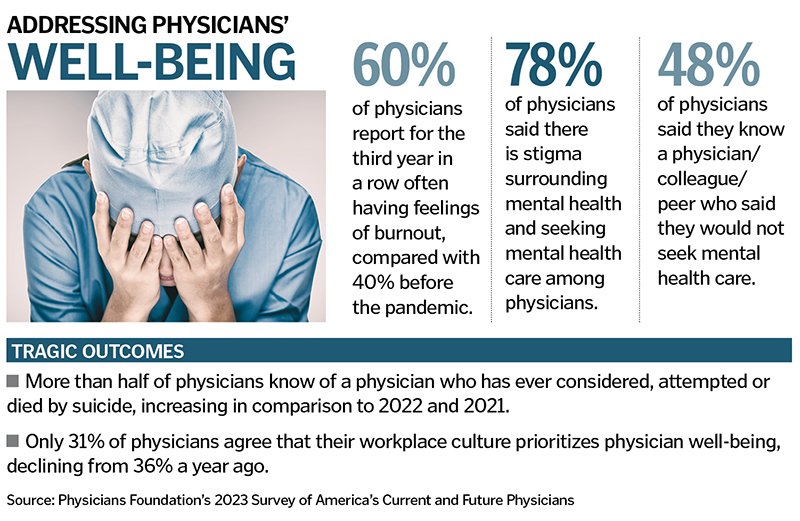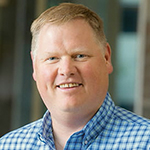
It would take a nearly 27-hour day for physicians to follow all nationally recommended guidelines to care for an average number of patients, according to a 2022 study. When he was starting work addressing clinician burnout around 2015, Dr. Aaron Shoemaker remembers another study that said it would take "only" 22 hours.

"That's a long day," he quipped. "There's not a lot of sleep in there."
Shoemaker is a co-lead with Dr. Jennifer Stanley of the Ascension National Clinician Engagement and Well-Being Council, which works with advanced practice providers and leaders systemwide to address clinician burnout.
St. Louis-based Ascension is one of the nation's largest health systems, with about 5,200 physicians and 2,300 advanced practice providers. It has been honored three times by the American Medical Association's Joy in Medicine Health System Recognition Program, most recently last year, for its efforts to reduce burnout and improve well-being among physicians.
Widespread concern
In 2023, for the third year in a row, a survey of doctors by The Physician's Foundation found
that six in 10 often experience feelings of burnout.
"Lots and lots of physicians left during the pandemic," said Shoemaker. "And I think burnout is a real thing. A lot of physicians are leaving medicine because they're going to work for an insurance company. Or they're retiring at 55 instead of 65."

As the leads of the well-being council, Stanley, a family medicine doctor with Ascension Medical Group in North Vernon, Indiana, and Shoemaker, who specializes in internal medicine and pediatrics with Ascension Medical Group in Fishers, Indiana, are in charge of a council of about 40 physicians who meet regularly to discuss how to best help clinicians.
Wellness tools
To start its work, the well-being council looked to the Stanford Model of Professional Fulfillment to
focus on three domains of well-being: a culture of wellness, efficiency of clinical practice, and personal resilience. Following that model and on the council's advice, Ascension has rolled out several efforts to help.
It has developed a clinical well-being and engagement "playbook" to get everyone on the same page to develop things like a clinical symposium, a networking event, and a refill protocol.
Stanley helped write the playbook, which has been updated several times. "It's all of those best practices we have collected from across the country, all tucked into one book," she said.
Ascension also adopted the Mayo Clinic's Well-Being Index, an online assessment tool for health care workers that measures distress and is accessible via an app. Clinicians can use the app to answer a few questions about how they're doing and feeling. The app can show their results over time and connect them with resources.
Spotting issues
Shoemaker said data shows that if clinicians develop mental health issues, medical mistakes that result in harm can follow, and, at the extreme end, physician suicide. Tools like the Mayo Clinic's well-being app
can help leaders spot issues as they develop.
"If we want to live our mission and impact the health of our individuals in the communities we live in, we have to do it with a well clinician workforce," Shoemaker said.
While individual answers remain anonymous, Ascension leaders can see overall results from the app and address concerns.
"For example, we identified that our newest clinicians were struggling, and so that really was the impetus for us to make an improved onboarding program," said Stanley. "We take that feedback and can use it to direct things."
In 2021, Ascension launched a peer support program to help clinicians after they've gone through a critical event, loss or another stressful situation like treating a mother who had gone into cardiac arrest after having a baby.
"Those sorts of things that happen really are emotionally difficult to process," said Stanley. "This is an opportunity for those folks to connect with a peer, not to provide therapy or counseling, but to simply say, How are you? It's really to just give them a space, it might be five minutes, it might be 30 minutes, it might be a phone call on Monday, and then another phone call on Thursday to check up. So it's relatively informal."
Ascension also looks for ways to help doctors work more efficiently and to reduce "pajama time" completing paperwork outside regular daytime hours. The health system has seen a correlation between increased pajama time hours and turnover, Shoemaker said.
"Can we go out and find those people, and then give them special education, and say, Hey, we're noticing that you can do this, or you're having trouble with this, let's help," he said.
Help can come in many forms, such as a template to document all the components of a well child exam or by showing physicians how to reduce keystrokes while typing in the electronic medical record.
Fostering growth
Providing professional growth opportunities, such as coaching, mentoring, and symposiums for women and clinicians from underrepresented groups, is also part of Ascension's overall well-being efforts.
A program called Elevate helps clinicians become better leaders by sharpening their emotional intelligence and communication skills. Stanley helped plan that program, which consists of a yearlong session with monthly remote meetings. Senior leaders participate in the calls and rising leaders ask questions, letting everyone get to know one another, she said. The rising leaders end Elevate with a capstone project, which they present to senior leadership.
Stanley said several of the projects have led to systemwide programs. "And so the rest of the organization benefitted," she said.
As Stanley explains to clinicians from all religious backgrounds, the well-being council's efforts align with the mission of Ascension as a Catholic ministry "rooted in the loving ministry of Jesus as healer.
"It doesn't say as Jesus our savior. No one can deny that Jesus touched one person at a time and healed them, and that's what we're called to do," said Stanley. "Whether I sit in an exam room with someone and simply be present while they tell me how difficult it is since her husband has passed away, whether I sit with a physician who's struggling because she's drowning in charting and can't get home to her kids, I see how I can help. That's what we do."
